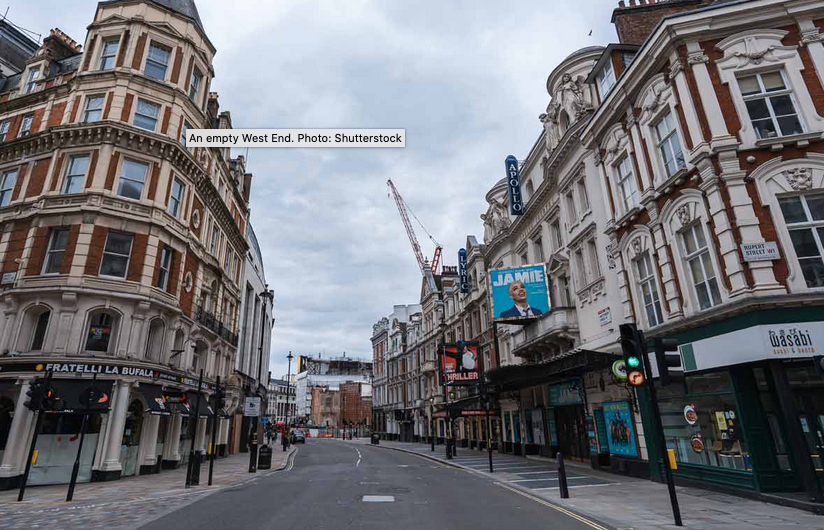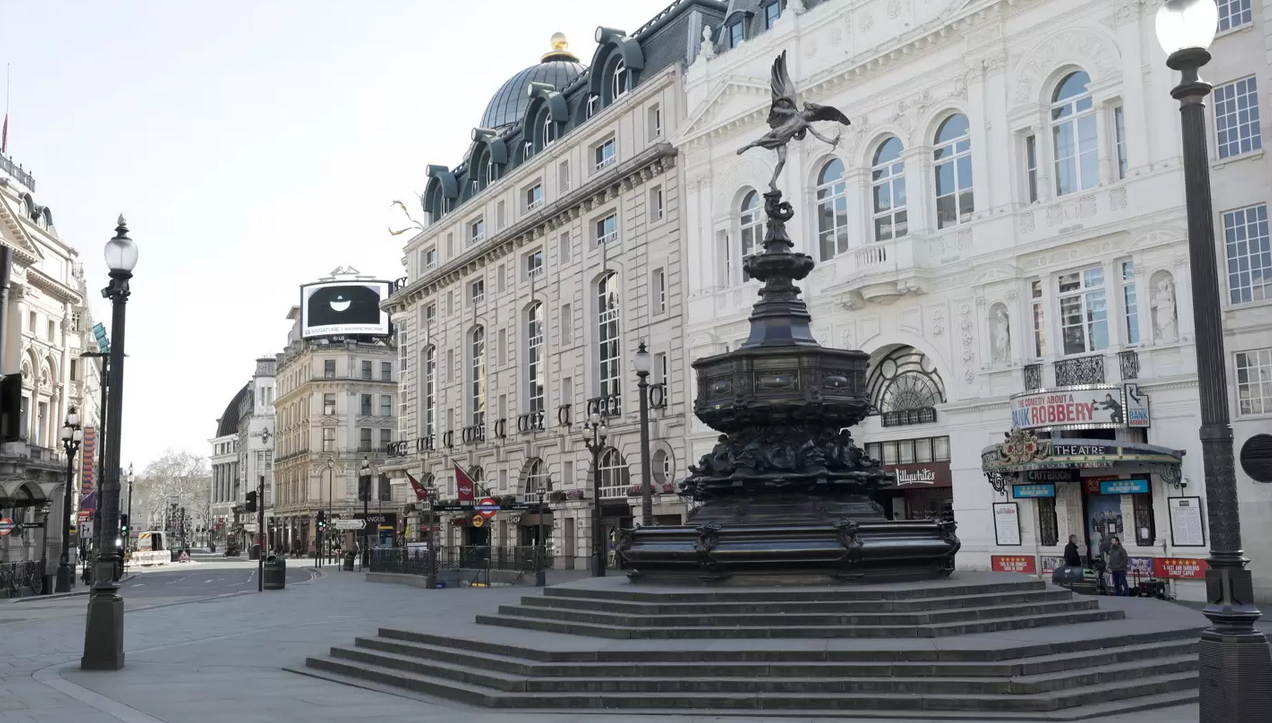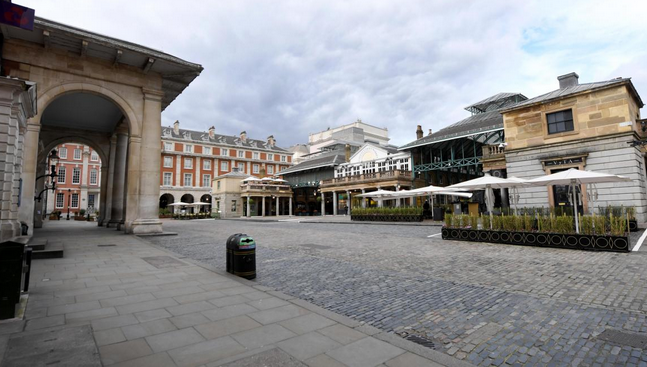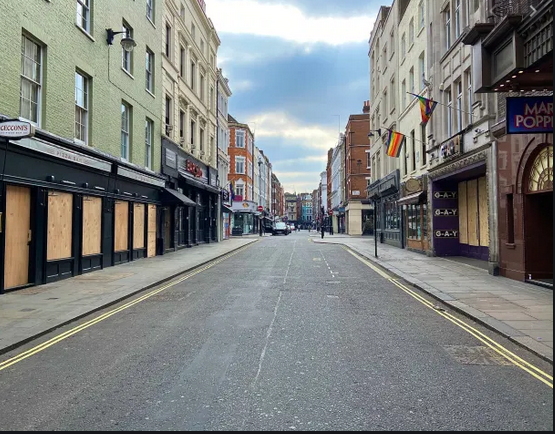Remember the summer, when the government was actively encouraging people to return to their offices — basically, to save Pret?

As Ben Chu noted for The Independent in August, “Some people at the heart of government are clearly worried about the economic impact of the fact that millions of workers are continuing to work from home even though the official requirement for them to do so has gone. There are reports that ministers have been alarmed, as they are chauffeured through empty city centres [pictured above, an empty Shaftesbury Avenue], at the sheer lack of people on the streets and the knock-on impact of that absence on those businesses that support office workers.”
As the glorious Marina Hyde — surely the liveliest of all commentators holding the government’s feet to the fire every week — wrote in The Guardian back on August 28,
“A major government push to herd office workers back to city centres was trailed today in Johnsonian jazz mag the Daily Telegraph, beneath the thoughtful headline Go back to work or risk losing your job.’ Or to put it another way … Leave home. Forget the NHS. Save Pret.”
Another essential guide through the political Armageddon of conflicting messages and self-interest that has characterised the government’s response to the pandemic from Boris Johnson and his patently ridiculous cabinet of out-of-their-depth fools and charlatans has been Byline Times; on September 3, Christiana Spens argued there,
“Perhaps the real reason that the Government is so keen to get people back to work is not simply to save chains like Pret-a-Manger but so that some private equity-backed major regeneration projects can stay afloat, particularly in the City. Firms such as JP Morgan, Equistone Partners Europe Limited, LDC, AXA, Aviva, Legal & General and Northern & Shell have a huge interest in protecting commercial property developments in the City, and COVID-19 has presented myriad issues for them. With commercial tenants potentially unable (or unwilling) to make lease payments as the crisis continues, they risk making massive losses. These firms rely on workers being in the City so that companies continue to want to let their spaces, and even to build them in the first place. Current developers, and their investors, need to know that their properties will be attractive to companies who want to fill them, for investment to continue and for their businesses to be sustainable. Already, however, several big companies have made the decision to close their offices and give up their leases.”

There’s no question that the City and West End are already starting to look very different. And here we are. Five months later, we’re now being told again not to venture out at all. That makes sense: there’ll be no need to save them at all if we’re all dead. But there’s a bigger concern about whether people will actually ever come back in the numbers they used to.
As Ben Chu argued in the piece quoted earlier, “It’s understandable that ministers are trying to encourage people back to the office. And there probably will indeed be high-profile economic costs and casualties if the commuters and office workers don’t flood back in the coming months. But the danger is that the government is shoving against the tide of a major structural economic change….”

There’s been a behavioural (and technological) shift that has made working from home both possible and more productive for those who can do it. No more time wasted commuting! But there’s also a more pressing concern for those of us who work in (or want to take advantage of) London’s cultural offerings: if people aren’t coming into town, where will they find their audiences?
Personally, I made a conscious choice many years ago to live as close to where the majority of those are sited: I now live a block away from Borough tube, so I already have theatres like Southwark Playhouse, the Globe, Menier Chocolate Factory, the Old Vic and the Young Vic, the Union Theatre and Waterloo East all within 10 to 15 minutes of my doorstep, with the National and Bridge just a few more minutes on that. I can drive into the West End in ten minutes, too (and pride myself on being able to find parking within five minutes walk of just about any theatre you can name; but no, I’m not telling you where!).
But for those who live further afield, the effort of coming into the West End after a day of home-working may prove less attractive; we all know how hard it is to leave the house sometimes. Add to this the current near-total absence of tourists, and central London already offered a sneak peak of what the future might look like before the current lockdown, with sparsely occupied streets everywhere (think of any regional city once the shops shut at 6pm and you’ll get an idea of what that looks like).

If office workers don’t return to central London, and the tourists are slow to return, too, this doesn’t bode well for West End theatres, concert halls and so on when they’re ready to re-open.
And yet the cultural economy is, or was, a booming sector. As Toby Matharu recently wrote in an article in Arts Professional that was headlined “Culture is London’s business”,
“Prior to Covid-19, London’s globally recognised cultural offer was a vital component of the London and UK economy, and a significant, inextricable contributor to London’s pre-eminence as a leading world city to visit, live and work. London’s world-renowned cultural and heritage assets are major drivers of tourism: invaluable in attracting inward investment, international tourists and students, and it is a major contributor to the UK’s position at the top of the Sot Power 30 index. Now, with the coronavirus and the response to it, and an unsatisfactory Brexit, London’s competitive advantage as a global business hub is at risk.”
It’s a massive part of our economy. As he also pointed out,
“Culture in London drives both leisure and business tourism, generating £47bn for the UK annually. Cultural tourists spend over £7bn a year and London’s cultural tourism contribution to the wider economy amounts to £8.3bn. In central London, the cultural sector alone contributed an estimated £4.8bn in gross value added (GVA)…. London’s top 18 museums and galleries saw around 50 million visits. In London alone, there were as many as 97,000 jobs in music, performance, and the visual arts, and 17,600 jobs in museums, galleries, and libraries. Several hundred thousand hospitality and other jobs are directly connected to the sector.”
The West End — like Broadway — has registered year-on-year gains in both attracting audience numbers and revenues made (thanks to ever-increasing ticket prices), for many years now. That was, of course, wiped out last year, and it could be a long while before it fully recovers, if ever.
And combined with the impact of Brexit, this doesn’t bode well for our economic future. As the Arts Professional report cited earlier also noted, “The value of retaining London’s cultural and arts offering for London’s economy cannot be overestimated. While various indices of world cities reveal London’s success is attributable to several factors, London’s unique breadth of high-quality cultural activities is an undeniably significant factor. This alone should help commercial businesses understand the positive impact of partnering with cultural initiatives, driving customers directly to their organisations and supporting an environment in which their businesses can flourish… London’s internationally connected economy depends on the free flow of capital, trade and people, and its creative sector is no exception. The fallout from Brexit has added to this dangerous cocktail. A third of London’s creative jobs are filled by international talent and just under half of the UK’s creative services export is to the European Union. Partnership and collaborative working will be essential, with a shared vision to support the sector and generate individual and collective value from collaborative action.”
And yet, as I noted here just yesterday, that is being seriously jeopardised by a government that is so intent on prohibiting any free movement at all it is refusing to make concessions for visiting artists to the UK, and has therefore opted out of the EU’s offer for visa-free arrangements for British musicians going to the EU as it doesn’t want to have to reciprocate.
So we’re losing more than just money: we’re losing our soft power, too. As Tony Matharu put it in Arts Professional,
“The international cut-through of our cultural output is important in building soft power and influence, and it’s needed now more than ever. London is a cultural superpower: its orchestras, theatres, dance companies, opera houses, museums and galleries play a powerful ambassadorial role around the globe. … A nation that is liked, admired, and respected is much more likely to find political allies, secure trading partners, and draw in new talent, tourists, and investors. Brexit presents extraordinary challenges but also opportunities that must be recognised by those in positions of influence, whether in the public, private, or creative sector.”
It’s extraordinary that a government that panicked on behalf of Pret-a-manger’s survival is not doing the same for the far more significant cultural sector.

